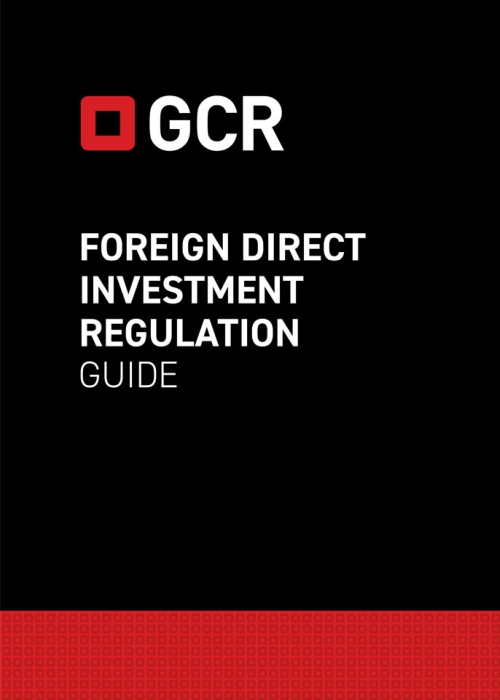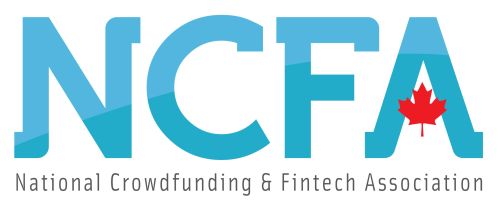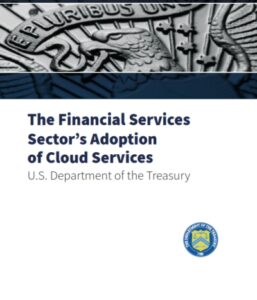Foreign Direct Investment | Jan 5, 2024

 Image: CGR FDI Trends 3rd Edition
Image: CGR FDI Trends 3rd EditionGrowing Importance and Complexity of FDI
Global Competition Review recently published their annual global overview of Key FDI Trends called "Foreign Direct Investment Regulation Guide - Third Edition" edited by Veronica Roberts provides a comprehensive look at the evolving landscape of foreign direct investment (FDI) regulation.
FDI regulation has become increasingly significant in recent years, especially in the context of unstable economic conditions. Despite high FDI flows, there is a trend towards greater protectionism and stricter enforcement due to heightened geopolitical tensions and the need to keep strategic industries onshore.
Increased Scrutiny in Cross-border M&A
There is a shift towards stricter scrutiny in policy frameworks for screening inward foreign investment, especially in strategic sectors, directly impacts fintech and alternative finance. This is evident in several high-profile deals that have been blocked, unwound, or abandoned due to FDI regulatory concerns. This trend underscores the importance of early identification of potential FDI screening issues in transaction planning.
See: China Intensifies Cracksdown on Tether in Forex Trading
FDI screening authorities are becoming more active, both in terms of the number of notifications received and in monitoring non-notified transactions. This increased activity can impact M&A activity, as mandatory filing obligations may dissuade some investors.
Evolving Concept of National Security
The scope of sectors and technologies considered under the concept of national security in FDI regulation has broadened. It now includes critical infrastructure, communications assets, advanced technology, and data. The rise in protectionist policies, partly accelerated by the COVID-19 pandemic, could influence the flow of capital in alternative finance. While this might foster domestic investments, it could also limit the scope for international fundraising and partnerships, challenging the growth of global crowdfunding platforms and peer-to-peer lending services.
See: OSFI’s Evolving Focus on Integrity & Security
The broadening of the national security concept makes it difficult for investors to confidently assess the risk of government intervention under FDI rules. However, some guidance is available, such as the US President's Executive Order issued in September 2022, which provides a framework for evaluating transactions.
Technological innovations in fintech and blockchain are often at the forefront of FDI discussions. The dual-use nature of these technologies, serving both economic and potential military applications, places them under intense scrutiny. Companies in these sectors must be prepared to address security concerns to attract foreign investments.
Stay Informed and Agile
Businesses in fintech, blockchain, and alternative finance must stay abreast of regulatory changes globally. This involves not only compliance but also active engagement in policy discussions to shape a favorable regulatory environment.
Diversifying investment sources can mitigate risks associated with geopolitical tensions and economic nationalism. Exploring new markets and investor bases can provide stability and growth opportunities.
See: Regulating AI in Canada: The Proposed AI and Data Act (Bill C-27)
Data is king. Robust data security and privacy measures can make fintech and blockchain ventures more attractive to cautious investors.
Forming alliances with domestic and international partners can help navigate the complex FDI environment. This approach can facilitate knowledge exchange, regulatory compliance, and access to broader markets.
Conclusion
The "Foreign Direct Investment Regulation Guide - Third Edition," edited by Veronica Roberts, offers an essential exploration of the increasingly complex world of FDI. In today's environment, marked by heightened geopolitical tensions and economic uncertainties, FDI regulation plays a pivotal role, especially in sectors like fintech, blockchain, cryptocurrency, and alternative finance.
See: U.S. Seed Fundraising Insights and Trends
The guide underscores the growing importance of understanding and navigating the expanded scope of national security within FDI regulation, which now encompasses a wide range of sectors and technologies. For businesses operating in fintech and blockchain, this means grappling with dual-use technologies (civilian and military) and ensuring robust data security to attract foreign investments.

 The National Crowdfunding & Fintech Association (NCFA Canada) is a financial innovation ecosystem that provides education, market intelligence, industry stewardship, networking and funding opportunities and services to thousands of community members and works closely with industry, government, partners and affiliates to create a vibrant and innovative fintech and funding industry in Canada. Decentralized and distributed, NCFA is engaged with global stakeholders and helps incubate projects and investment in fintech, alternative finance, crowdfunding, peer-to-peer finance, payments, digital assets and tokens, artificial intelligence, blockchain, cryptocurrency, regtech, and insurtech sectors. Join Canada's Fintech & Funding Community today FREE! Or become a contributing member and get perks. For more information, please visit: www.ncfacanada.org
The National Crowdfunding & Fintech Association (NCFA Canada) is a financial innovation ecosystem that provides education, market intelligence, industry stewardship, networking and funding opportunities and services to thousands of community members and works closely with industry, government, partners and affiliates to create a vibrant and innovative fintech and funding industry in Canada. Decentralized and distributed, NCFA is engaged with global stakeholders and helps incubate projects and investment in fintech, alternative finance, crowdfunding, peer-to-peer finance, payments, digital assets and tokens, artificial intelligence, blockchain, cryptocurrency, regtech, and insurtech sectors. Join Canada's Fintech & Funding Community today FREE! Or become a contributing member and get perks. For more information, please visit: www.ncfacanada.org Related Posts
- SEO Powered Content & PR Distribution. Get Amplified Today.
- PlatoData.Network Vertical Generative Ai. Empower Yourself. Access Here.
- PlatoAiStream. Web3 Intelligence. Knowledge Amplified. Access Here.
- PlatoESG. Carbon, CleanTech, Energy, Environment, Solar, Waste Management. Access Here.
- PlatoHealth. Biotech and Clinical Trials Intelligence. Access Here.
- Source: https://ncfacanada.org/global-competition-review-key-fdi-trends/
- :has
- :is
- :not
- 150
- 200
- 2018
- 32
- 3rd
- a
- accelerated
- access
- Act
- active
- activity
- address
- advanced
- Advanced Technology
- affiliates
- AI
- Alliances
- also
- alternative
- alternative finance
- an
- and
- annual
- applications
- approach
- ARE
- artificial
- artificial intelligence
- AS
- assess
- Assets
- associated
- At
- attract
- attractive
- Authorities
- available
- BE
- become
- becoming
- been
- Bill
- blockchain
- blocked
- both
- broader
- businesses
- but
- by
- cache
- called
- CAN
- Canada
- capital
- cautious
- challenging
- Changes
- China
- closely
- Communications
- community
- Companies
- competition
- complex
- complexity
- compliance
- comprehensive
- concept
- Concerns
- conditions
- confidently
- considered
- context
- could
- COVID-19
- COVID-19 pandemic
- create
- critical
- Critical Infrastructure
- cross-border
- Crowdfunding
- crowdfunding platforms
- cryptocurrency
- data
- data security
- data security and privacy
- Deals
- decentralized
- Despite
- difficult
- digital
- Digital Assets
- direct
- directly
- discussions
- dissuade
- distributed
- Domestic
- due
- Early
- Economic
- Economic Conditions
- ecosystem
- edition
- Education
- encompasses
- engaged
- engagement
- ensuring
- Environment
- especially
- essential
- Ether (ETH)
- evaluating
- evident
- evolving
- exchange
- executive
- executive order
- expanded
- exploration
- Exploring
- facilitate
- favorable
- Filing
- finance
- financial
- financial innovation
- fintech
- flow
- Flows
- Focus
- For
- For Investors
- forefront
- foreign
- foreign investment
- forex
- Forex Trading
- Foster
- Framework
- frameworks
- from
- funding
- funding opportunities
- Fundraising
- geopolitical
- get
- Global
- Globally
- Government
- government intervention
- grappling
- greater
- Growing
- Growth
- guidance
- guide
- Have
- heightened
- help
- helps
- High
- high-profile
- However
- http
- HTTPS
- Identification
- image
- Impact
- Impacts
- importance
- in
- includes
- increased
- increasingly
- industries
- industry
- influence
- information
- informed
- Infrastructure
- Innovation
- innovations
- innovative
- insights
- Insurtech
- integrity
- Intelligence
- Intensifies
- International
- intervention
- investment
- Investments
- investor
- Investors
- involves
- Issued
- issues
- IT
- Jan
- jpg
- Keep
- Key
- King
- knowledge
- landscape
- lending
- like
- LIMIT
- Look
- M&A
- make
- MAKES
- mandatory
- marked
- Market
- Markets
- max-width
- May..
- means
- measures
- member
- Members
- might
- Military
- Military Applications
- Mitigate
- monitoring
- more
- must
- National
- national security
- Nature
- Navigate
- navigating
- Need
- networking
- New
- notifications
- now
- number
- obligations
- of
- Offers
- often
- on
- only
- operating
- opportunities
- or
- order
- overview
- pandemic
- partners
- partnerships
- payments
- peer to peer
- peer-to-peer lending
- perks
- pivotal
- Places
- planning
- Platforms
- plato
- Plato Data Intelligence
- PlatoData
- plays
- please
- policy
- potential
- prepared
- president
- privacy
- projects
- proposed
- provide
- provides
- published
- range
- received
- recent
- recently
- Regtech
- regulating
- Regulation
- regulatory
- Regulatory Compliance
- review
- Risk
- risks
- robust
- Role
- rules
- s
- scope
- screening
- scrutiny
- Sectors
- security
- seed
- September
- Services
- serving
- several
- Shape
- shift
- significant
- some
- Sources
- Stability
- stakeholders
- stay
- Stewardship
- Strategic
- stricter
- such
- Technologies
- Technology
- tensions
- terms
- Tether
- that
- The
- their
- Them
- There.
- These
- Third
- this
- thousands
- to
- today
- Tokens
- towards
- Trading
- transaction
- Transactions
- treasury
- Trend
- Trends
- u.s.
- uncertainties
- under
- underscores
- understanding
- Ventures
- vibrant
- Visit
- which
- while
- wide
- Wide range
- with
- within
- works
- world
- years
- zephyrnet











